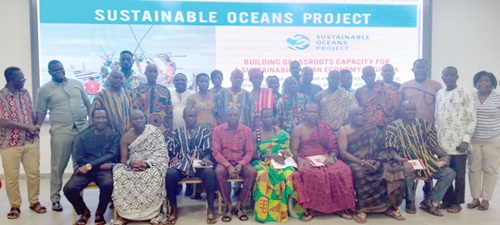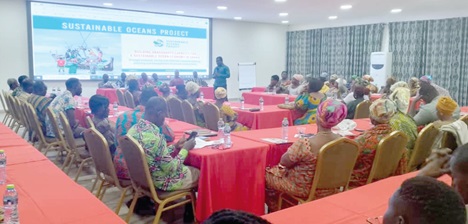
Sustainable Oceans Project in Central Region: Anti IUU champions, fishery stakeholders commit to reject ‘bad fish’
Anti-illegal, Unreported and Unregulated (IUU) fishing champions have engaged about 300 stakeholders in and around the Central Region to promote best fishing practices and reject "bad fish" fish caught with IUU.
The champions campaigned against "bad fish", urging fishmongers to desist from buying such fish as their support towards anti-IUU practices and urging fishermen to desist from IUU fishing.
Two seperate workshops were held at Winneba and Cape Coast as part of the Sustainable Oceans Project (SOP) to help reduce IUU in the fishing communities for healthier fishing while helping to restore fast-depleting fishery stocks.
They were attended by chief fishermen, fishermen, fishmongers and duty bearers from the district assemblies and related agency representatives.
The coastal districts were divided into three clusters with Efutu, Gomoa West, Awutu Senya and Gomoa East in one cluster with fishing communities including Winneba, Apam, Mumford, Dago, Fetteh and Senya.
The second cluster had Mfantseman and Ekumfi with communities including Kormantse, Anomabo, Ankful, Biriwa and Otuam participating.
The third cluster of districts included Komenda-Edina-Eguafo-Abrem, Cape Coast, and Abura Asebu Kwamankese with communities including British Komenda, Dutch Komenda, Ekon and Moree participating in Cape Coast.
Project
The SOP aims to reduce fish decline, build sustainability and secure fisherfolk access to sustainable fisheries resources through governance reforms to address over-capacity and illegal fishing and enhance participatory co-management.

The forum urged stakeholders to adopt sustainable fishing practices
It also seeks to improve the income resilience of fishing communities to climate and human-induced threats through enhanced opportunities for value addition along fisheries supply chains and enterprise development.
The SOP also aims at strengthening climate change adaptation and mitigation capacities in coastal areas, through improved spatial and land use planning and community-led management of wetland and mangrove ecosystems.
The IUU champions are women advocates trained under the SOP to promote the right mindsets, especially among women fishmongers to understand the implications of consuming "bad fish" and to reject such fish ultimately, discouraging fishermen from adopting IUU fishing practices.
The SOP
The SOP is a three-year Norad-funded project which is being implemented by the Environmental Justice Foundation (EJF), Hen Mpoano (HM), Friends of the Nation (FoN) and the Central and Western Fishmongers Improvement Association (CEWEFIA), with funding from the Norwegian Agency for Development Cooperation (Norad).
The project’s overarching goal is to have a resilient and sustainable ocean economy in Ghana achieved through inclusive, strong and effective capacity, planning and management of coastal ecosystems.
Over the next three years (2022 to 2025), the implementers will work to build grassroots capacity for a sustainable ocean economy in Ghana.
The various forums committed to best practices and the fishmongers to rejecting bad fish.
At the workshop in Cape Coast, one of the anti-IUU champions Mary Donkoh, said while they had committed to engaging the fishmongers on rejecting "bad" fish, they could not achieve the needed impact alone and appealed to all to reject bad fish to serve as a deterrent to perpetrators.
Reject bad fish
She said it was important for fishmongers to support the campaign to reject bad fish to reduce losses and ensure the health and safety of patrons.
Another anti-IUU champion, Elizabeth Obese, said fishmongers lost a lot of money invested when they bought fish caught with chemicals.
The forum appealed to the Fisheries Commission to test for bad fish at the landing beaches and arrest perpetrators.
The District Chief Executive for Abura-Asebu Kwamankese, Willyvans Obiri Awuah, said fishermen owed it to themselves, their families, communities and the nation to stop IUU fishing practices.
He said while education against IUU would be intensified, perpetrators must understand that the laws would not be merciful to anyone found to have violated the fishery laws by engaging in IUU.
Community support
The KEEA Municipal Director at the Fisheries Commission, Stephen Asempa, said the commission was working with the landing beach enforcement committees to ensure bad fish was not landed, adding that the community members including fishermen and fishmongers must committee to the fight against IUU to make it successful.
The Central Regional Director of the Ghana Standards Authority, Emmanuel Agbah, said fish was food and must be safe for consumption, adding that from the shore to packaging of fish must be done in adherence to safety standards.
The Central Regional Chairman of the Ghana National Canoe Fishermen Council, Nana Sanka, said it was in the interest of fishermen that they ceased all forms of IUU, saying the worrying state of the ocean's fishery resources was adversely impacting fishers’ livelihoods.
Nana Kweigya of Moree also said it was important to save the sea from further harm by halting all IUU practices.
The workshop also called for the de-politicisation of fishery issues for an effective fight against IUU practices.
It also called on duty bearers and opinion leaders to let the laws work without fear or favour.
